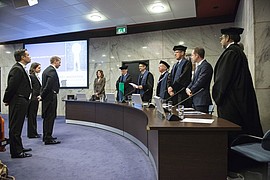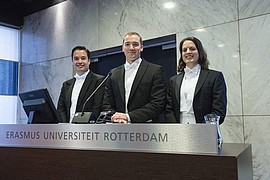PhD Defence: Jaco Smit

In his dissertation ‘Unlocking Business Model Innovation’ ERIM’s Jaco Smit finds a new perspective, in an empirical investigation of the effect of the process on arguably the most fundamental part of an organisation, its people.
Jaco defended his dissertation in the Senate Hall at Erasmus University Rotterdam on Friday, 21 October 2016 at 13:30. His supervisor was Prof. Harry Barkema. Other members of the Doctoral Committee were Dr Daan Stam (RSM Erasmus University), Prof Pursey Heugens (RSM Erasmus University) and Prof Anand Narasimhan (IMDB Lausanne)
About Jaco Smit

Jaco Smit was born on 27 March 1986 in Sandton, South Africa. He received his Bachelor’s degree in International Business Administration and Master’s degree (cum laude) in Innovation Management at Rotterdam School of Management, Erasmus University. Jaco continued his studies at RSM, starting his PhD in 2009. His research interests lie at the intersection of social psychology (particularly leadership theories) and business phenomena. Jaco is currently working in Human Resources as Organisational Effectiveness and Leadership Development Manager Europe and HR Business Partner for Sales Netherlands at Unilever.
Thesis Abstract

In the 21st century, consumers have an increasingly vast number of choices, yielding progressively less satisfaction, and firms have an ever expanding list of strategic choices, yielding progressively less value. Firms are forced to turn to innovative ways of doing business in order to satisfy customers and remain competitive.
When one speaks of innovation; images of new, technologically advanced or novel solutions for everyday needs are summoned. While this is entirely valid, it does not wholly encompass the concept of innovation. Having the most technologically advanced and up-to-date product offerings no longer suffices to satisfy growing consumer desires. Organizations have to split their focus to include business model innovation in the new business sphere and the crux of their success lies in recognizing the totality of business model innovation. It is as much about the end-state business model as it is about the path to implementation, and that in a holistic sense: the model, the people, and the environment.
This dissertation mirrors this perspective, attempting to pull apart the process and look through the keyhole at the inner workings of business model innovation. Each chapter is another step closer to capturing the totality mentioned but also further away from the business model itself. Starting close to current thinking - with a theoretical exploration of the business model innovation process - and ending with a new perspective, in an empirical investigation of the effect of the process on arguably the most fundamental part of an organisation, its people.
Photos: Chris Gorzeman / Capital Images


